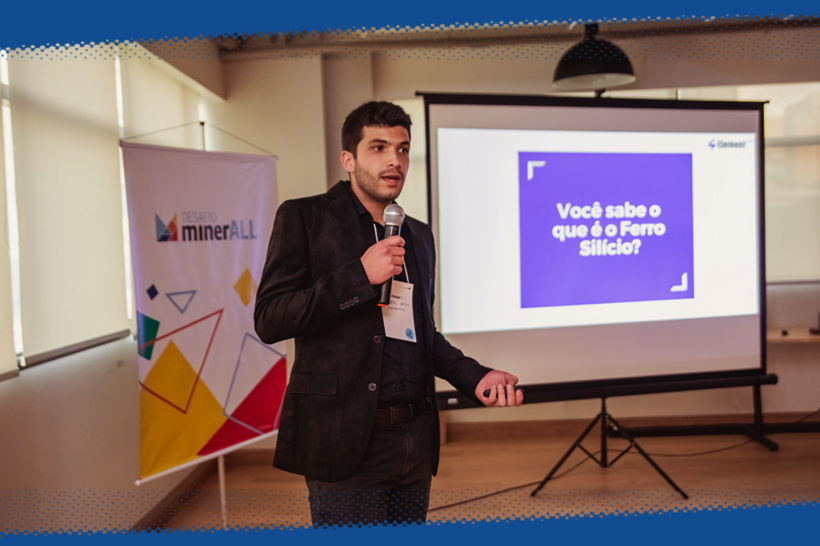30/09/2019

Transforming tailings reuse technologies into real business is the goal of the startups participating in the MinerALL Challenge, an open innovation project led by Samarco, corporate accelerator Neo Ventures, and Escalab, a scaling technology center. Among the finalists is Element [Si], whose trajectory will kick off a series dedicated to showcasing the four startups that are being set up as a result of the MinerALL Challenge.
Element [Si] is a hard science startup that develops briquettes used for the production of ferroalloys, with the objective of mitigating the environmental impacts of mining through the reuse of sandy tailings generated in iron ore beneficiation.
The company is formed by student Gabriel Saleh, graduating in Business Administration from Fundacao Getulio Vargas (IBS/FGV) and with a specialization in entrepreneurship from the Wharton University (online), responsible for the management of the startup; and by the recently graduated Anna Laura, Rafael Pedrosa and Raissa Basilio. Rafael Pedrosa holds a degree in Automation and Control Engineering from the Federal University of Ouro Preto (UFOP) and takes care of the operational part and product development. Anna Laura, graduated in Accounting from the Federal University of Vicosa (UFV) and Production Engineering from UFOP, and is responsible for the financial part; while Raissa, environmental engineer at UFOP, works in the company’s communication department.
“Our solution started to take shape when we realized that we could combine the mining tailings reuse issue with the challenge of reducing energy consumption in the production of ferroalloys, which is one of the sectors with the largest surplus in the Brazilian economy.”
According to Gabriel, the Element [Si] product is aimed at medium and large sized companies operating in the ferroalloy field. In addition to reusing the sandy tailings of iron mining, classified as inert and non-hazardous, it provides greater energy efficiency than other conventional alternatives.
“Linked with this economy, the use of sandy tailings allows us to achieve an adequate chemical composition, so that our product is the only raw material needed to feed the furnaces. Today this is done with two different materials. So, besides saving energy, we should also take into account the savings gained with logistics and material,”, says the startup founder. Element [Si] is conducting laboratory tests and it is expected that industrial testing will begin in the coming months.
He points out that Samarco’s support has been fundamental to the evolution of the startup. “Setting up the MinerALL Challenge was a very interesting action on the part of the company. Since the beginning of the program, we have received training, mentoring and technical support from professionals who work at the company and are references in their areas”, he says.
“For the future, we want to continue to develop products that are environmentally sustainable, but that also promote benefits when used. We were born into one of the leading educational institutions in the country (UFOP) and we strongly believe in the power of innovation, research and development. This leads us to build a close relationship with the academic field and the population of the region. That’s how we want to consolidate the company: pioneering the use of mining tailings to solve existing market pains”, concludes Gabriel.
The open innovation project Challenge MinerALL is led by Samarco, corporate accelerator Neo Ventures and Escalab, a scaling technology center. It is supported by the Federal University of Minas Gerais (UFMG), the Federal University of Ouro Preto (UFOP), the Center for Development of Nuclear Technology (CDTN) and the National Institute of Science and Technology (INCT Midas).
In the coming weeks, learn more about other startups that are part of the first edition of the MinerALL Challenge. Also understand the differences between the MinerALL Challenge and the Mining Hub and learn about the alternatives that are being developed by Samarco to reuse tailings, a by-product of iron ore beneficiation.